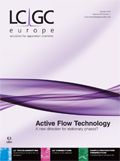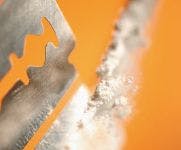ISCC and GCXGC 2015
ISCC and GCXGC 2015
The 39th International Symposium on Capillary Chromatography (ISCC) and the 12th GC×GC Symposium will be held jointly from 17–21 May 2015 in Ft. Worth, Texas, USA. ISCC is an important meeting for pressure and electrodriven microcolumn separations and related techniques, while GC×GC brings together the world leaders in the application of comprehensive multidimensional gas chromatography. The combination of these two meetings provides a rich forum for the fundamentals and applications of widely-used analytical techniques. Attendees can meet and discuss with world-renowned researchers and share their research work through oral and poster presentations. Strong technical programmes will be supplemented by short courses and vendor seminars, a lively social programme, and an exhibition by leading manufacturers, who will present innovative new software and hardware solutions.

(PHOTO CREDIT: WILLIAM H. EDWARDS/GETTY IMAGES)
The short courses will begin on Sunday 17 May and will include a full-day course on GC×GC led by John Dimandja and Phillip Marriot; a half-day course on sample preparation led by Nick Snow and Harold McNair; and a half-day course on ionic liquids led by Len Sidisky and Dan Armstrong. These are excellent opportunities for attendees to improve their background and understanding of core principles in these areas.
Those planning to attend the short courses, or those who simply want to enjoy more time in Ft. Worth, should consider arriving early to attend a rodeo in the Ft. Worth Stockyards on the evening of Saturday 16 May. Reserved seating and special events will be arranged for conference attendees. For those who cannot attend the rodeo a taste of Texas can still be enjoyed at the conference banquet on Wednesday 20 May, which will include live music and authentic Mexican cuisine in an iconic Ft. Worth location, Joe T. Garcia's garden restaurant. This conference series has historically offered the very best social events, and this meeting will live up to that expectation. Ft. Worth also has many exceptional museums and performance halls to visit, and it is right down the road from the Texas Rangers major league baseball ball park.
The invited speaker list is befitting of world-class international symposia. Plenary speakers will include George Whitesides from Harvard University. In addition, Sandy Dasgupta from the University of Texas at Arlington will discuss LC instrument design for the Mars mission. A complete list of invited speakers can be found on the website below and include: Michael Ramsey, Emily Hilder, Ralf Zimmerman, Robert Kennedy, Luigi Mondello, Frantisek Svec, James Harynuk, and Milton Lee. A wide range of fundamentals and applications of liquid and gas phase capillary-scale separation technologies and associated detection techniques will be conveyed by these and other speakers. Importantly, a very large poster session is also expected, and prizes, generously provided by conference sponsors, will be awarded for the best poster presentations. The Marcel Golay Award and the Leslie Ettre Award, both sponsored by PerkinElmer, will be awarded and accompanied by acceptance lectures. A variety of student grants and awards are available for those seeking to attend these meetings.
Holding the conference in Texas means that a significant emphasis can be placed on analytical sciences related to energy, petroleum, and resource development. Special sessions highlighting different aspects of petroleomics, gas analysis, and unconventional oil and gas extraction will ensure that attendees learn the most recent research developments in these fields.
The symposia will also provide exceptional coverage of environmental, food science, pharmaceutical, and bioanalytical research. The organizers hope to see you in Texas in May - to share in these meetings and to enjoy a rich scientific and vibrant social programme with all of the hospitality of the "Gateway to the West".
E-mail: info@isccgcxgc2015.comWebsite:www.isccgcxgc2015.com
26–27 January 20153rd Stir Bar Sorptive Extraction Technical Meeting
Novotel Paris Charaton, Paris, France
Tel: +33 160 783 210
E-mail: florence.chouly@restekfrance.comWebsite: www.sbsetechnicalmeeting.com
7–11 February 2015Fourth Annual Conference and Exhibition from the Society for Laboratory Automation and Screening
Walter E. Washington Convention Center, Washington DC, USA
Tel: +1 630 305 0003 (Ext. 317)
E-mail:jbystry@slas.orgWebsite: www.slas2015.org/registration/index.cfm
21–25 June 201542nd International Symposium on High Performance Liquid Phase Separations and Related Techniques (HPLC 2015)
International Conference Centre, Geneva, Switzerland
Tel: +41 22 839 84 84
E-mail:chairman@hplc2015.orgWebsite:www.hplc2015-Geneva.org
30 June–3 July 201521st International Symposium on Separation Sciences (ISSS 2015)
Ljubljana, Slovenia
Organizers: Slovenian Chemical Society in association with the National Institute of Chemistry and the Faculty of Chemistry and Chemical Technology, Ljubljana, Slovenia
Tel: +386 1 4760 265
E-mail: info@isss2015.siWebsite: www.isss2015.si
3–6 November 2015Recent Advances in Food Analysis
Clarion Congress Hotel, Prague, Czech Republic
Tel: +386 1 4760 265
E-mail: rafa2015@vscht.cz.
Website: www.rafa2015.eu
Please send any event news to Bethany Degg bdegg@advanstar.coma


.png&w=3840&q=75)

.png&w=3840&q=75)



.png&w=3840&q=75)



.png&w=3840&q=75)















